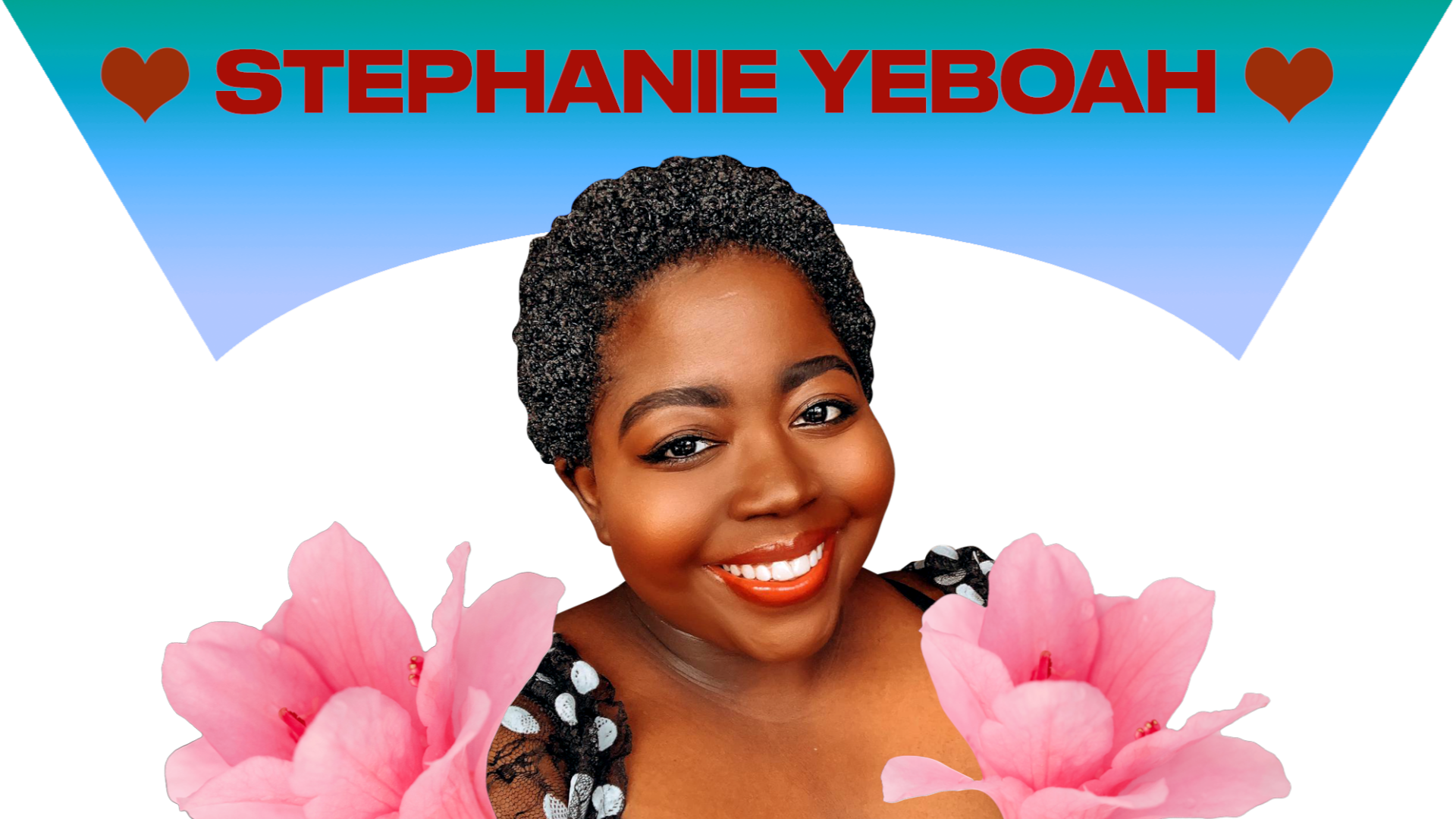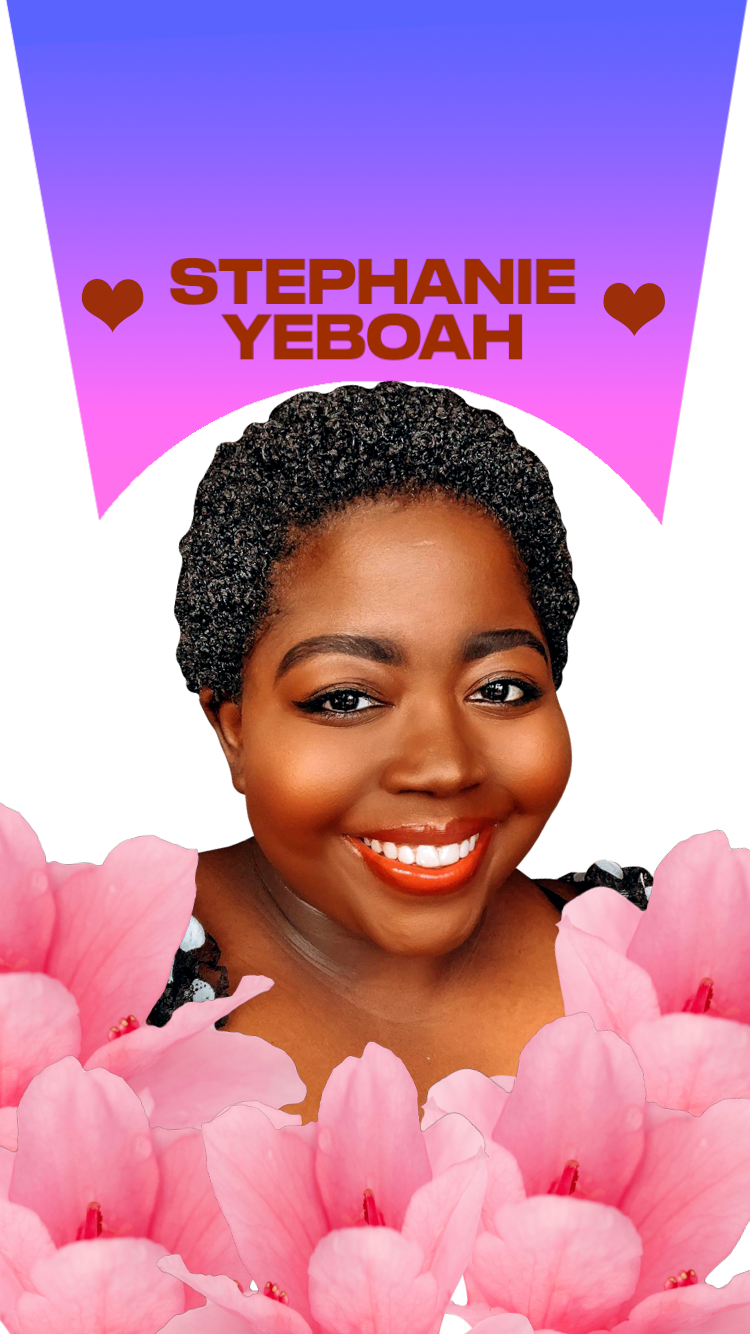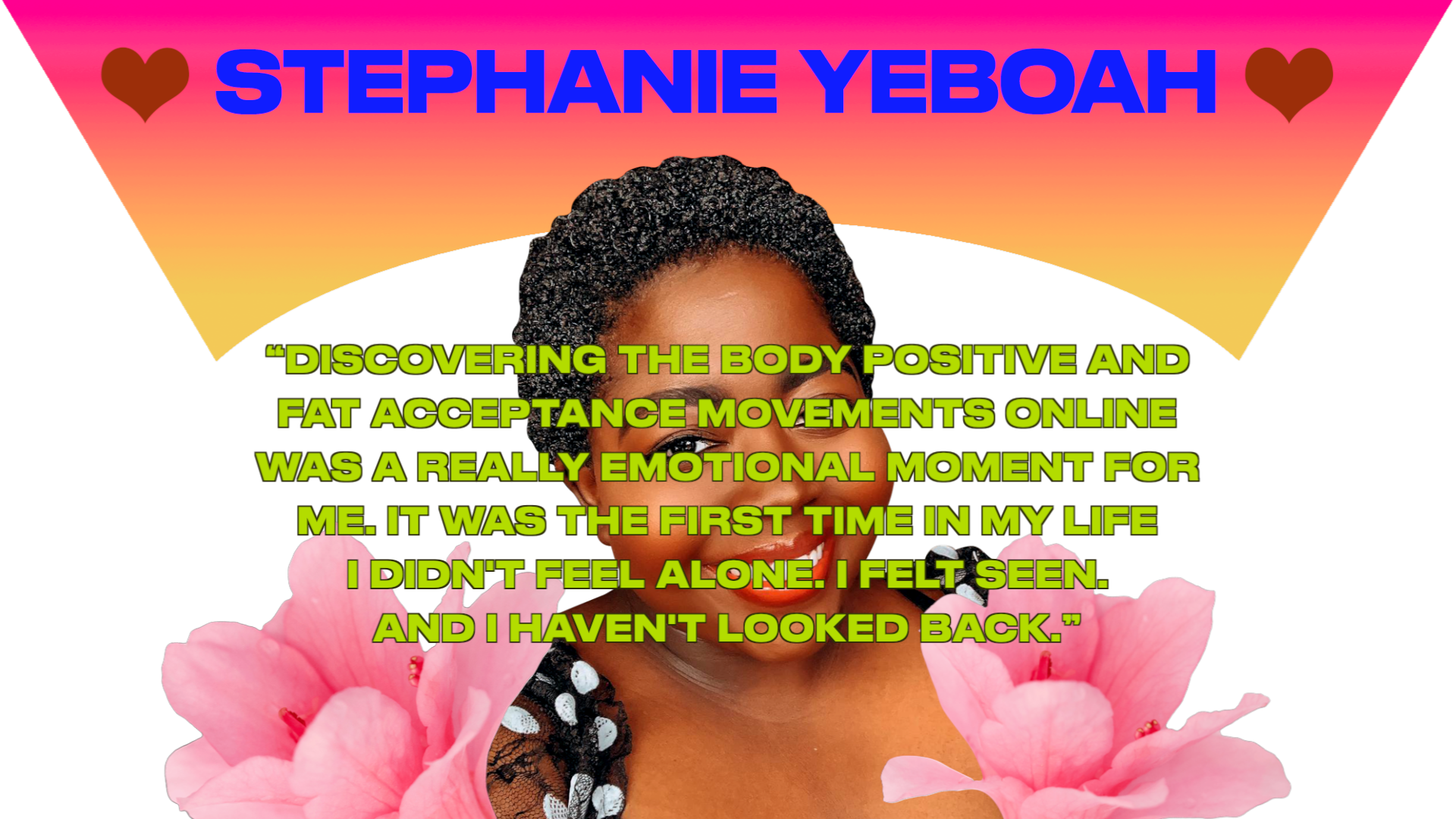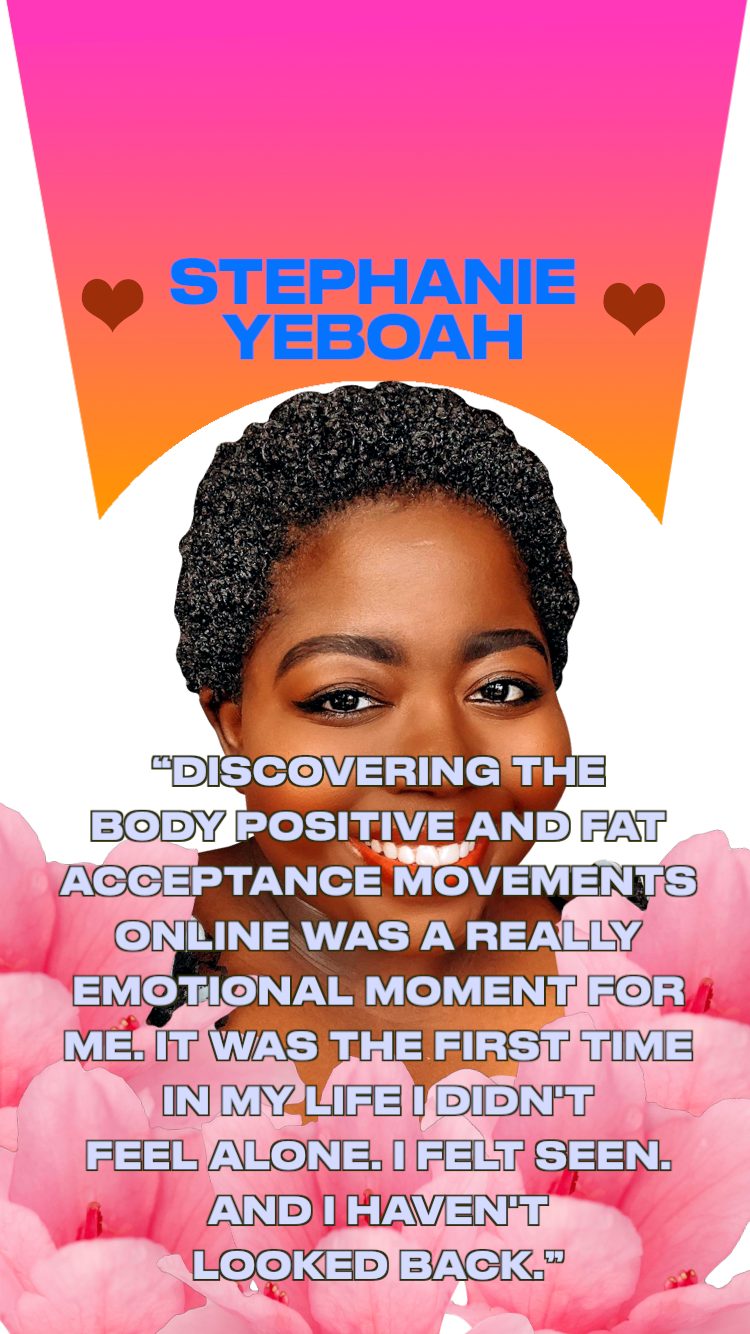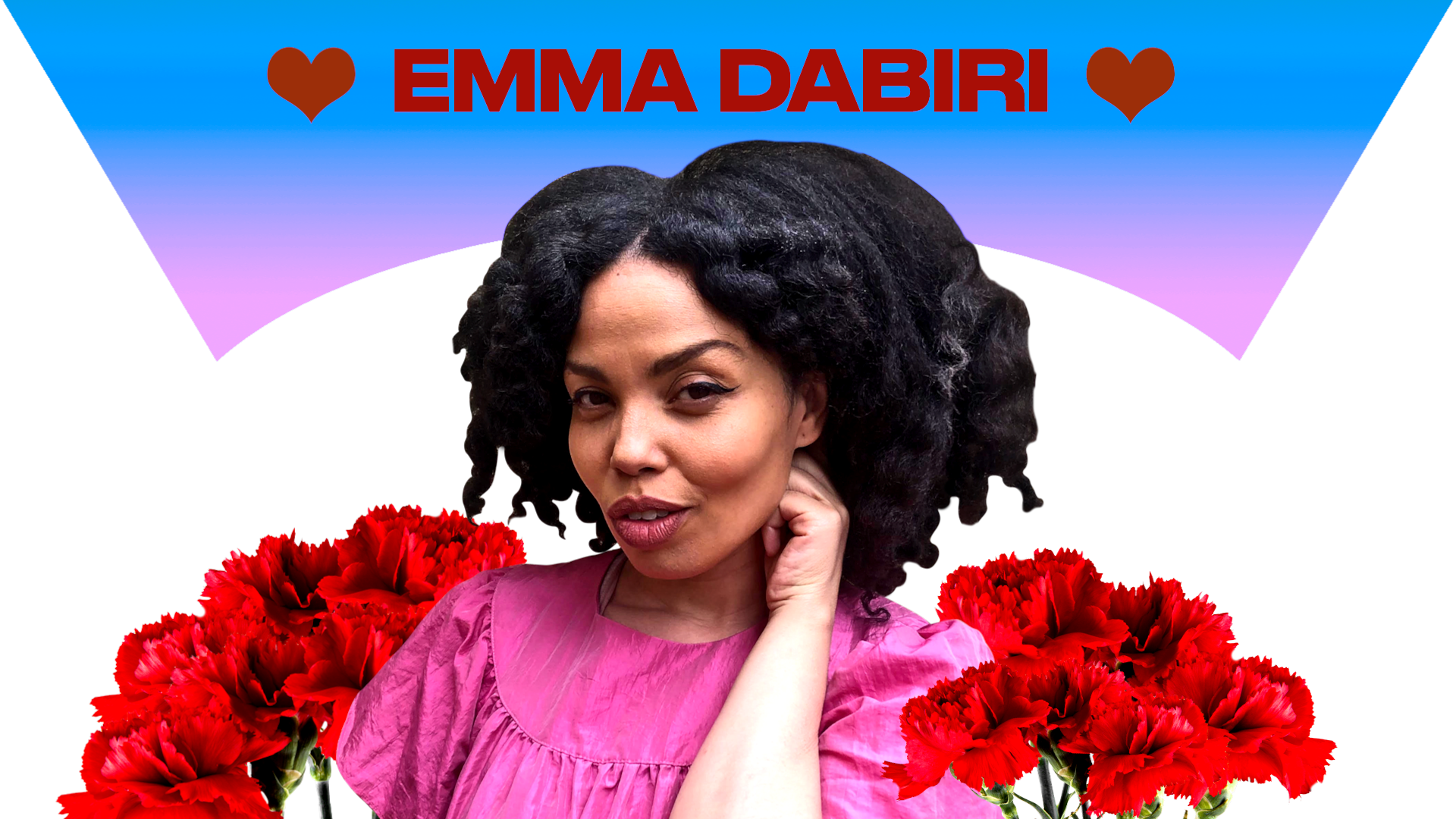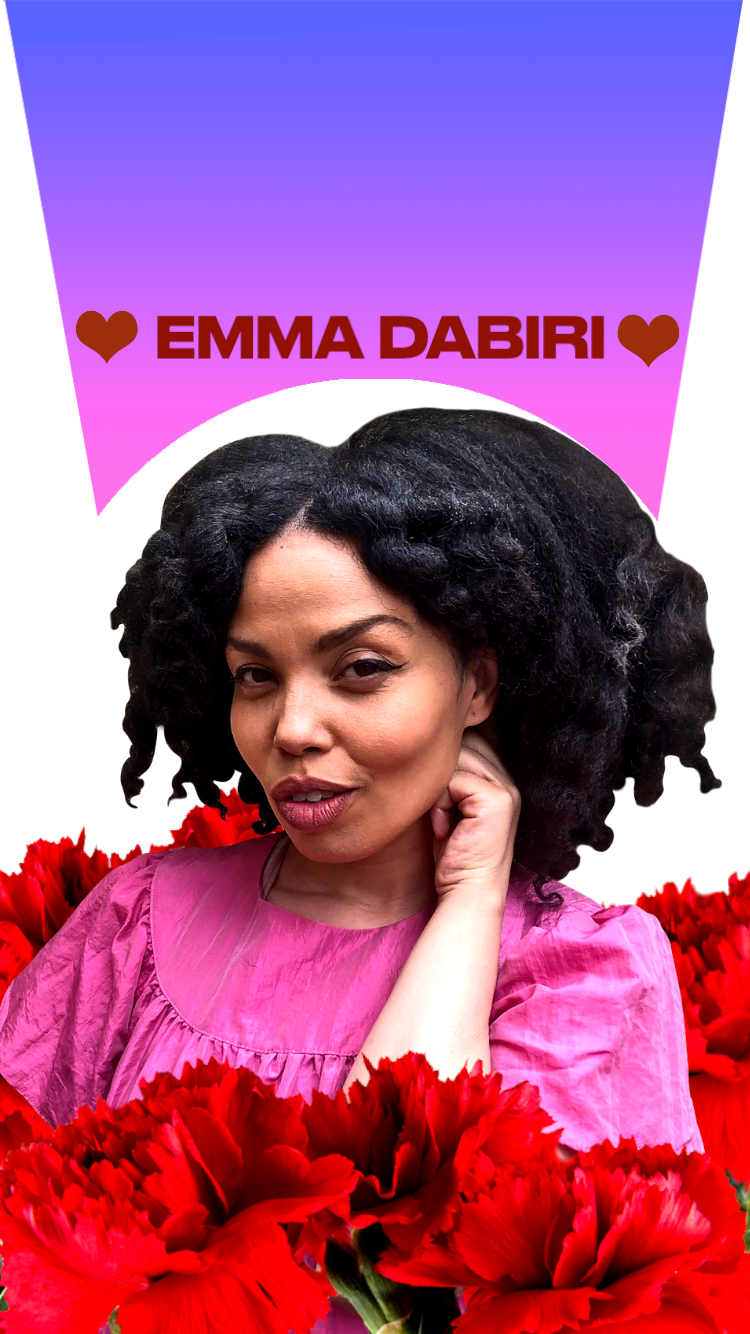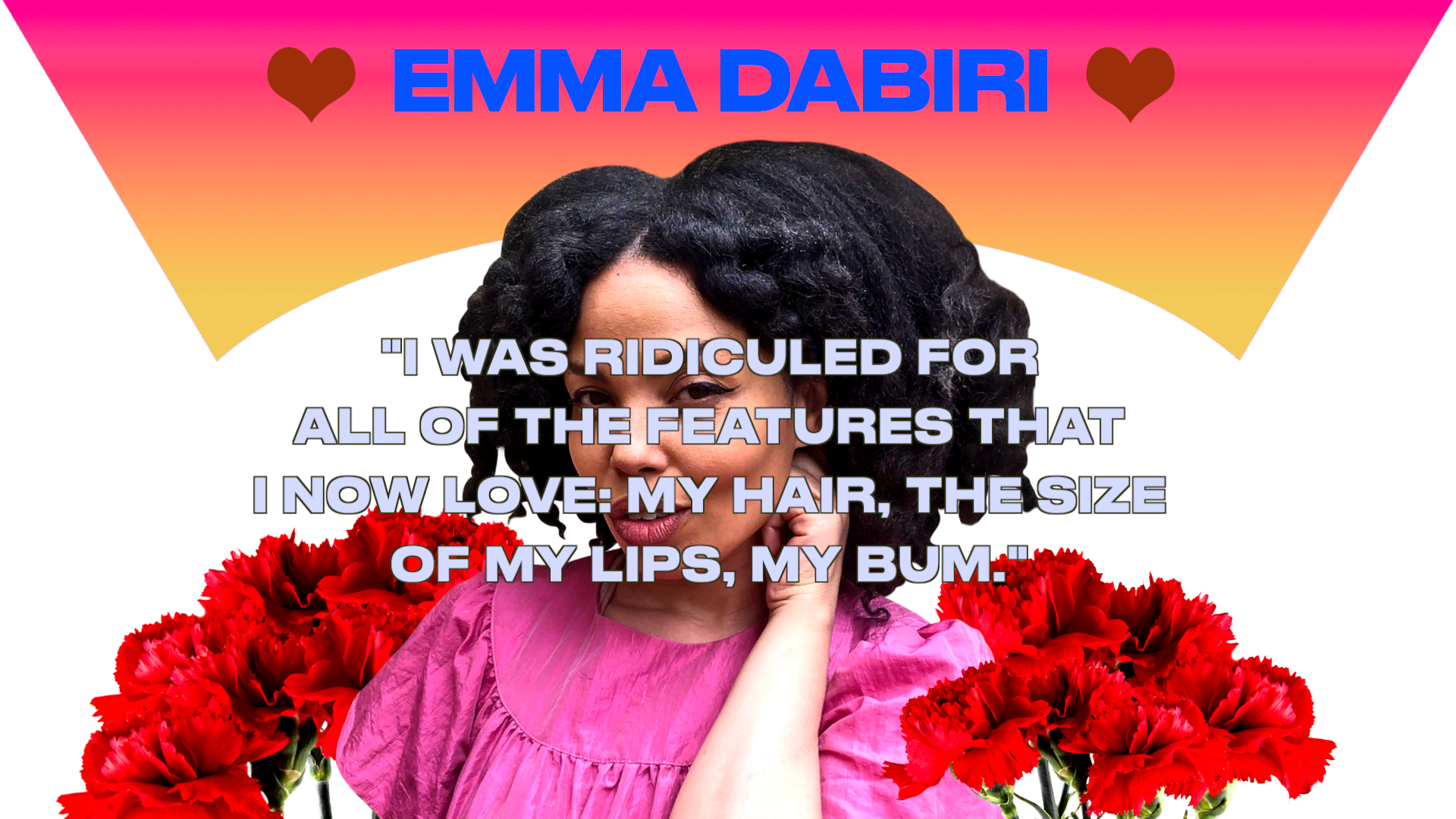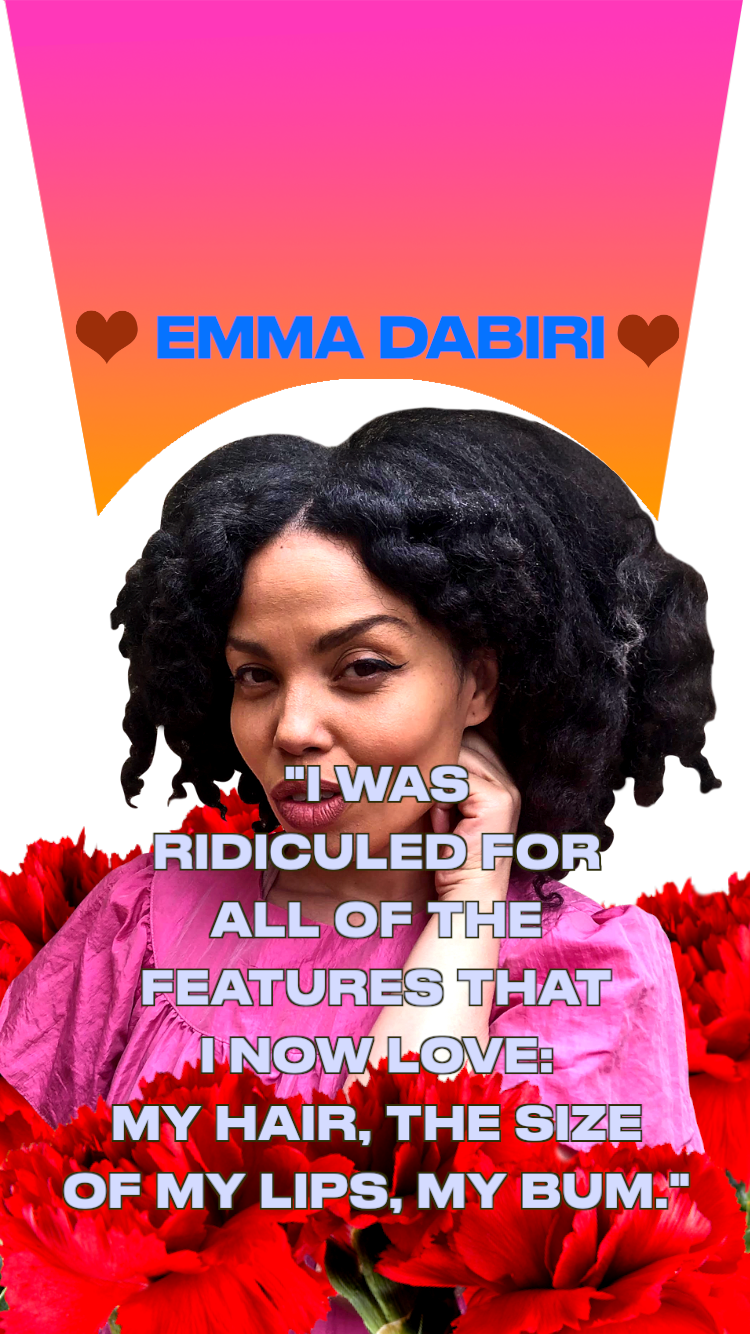“I Was Ridiculed For All The Features I Now Love”: Two Black Women Speak Honestly About Self-Esteem & Body Positivity
Human connection and feeling seen are vital to our sense of self and wellbeing. In a three-part series of virtual heart-to-hearts, as part of Refinery29’s Self-Service partnership with Dove, we’ve connected like-minded women to discuss beauty, body image, identity, visibility and activism in relation to self-esteem, to show the deep connection and wisdom that can come from speaking honestly about our experiences. In part one, Emma Dabiri and Stephanie Yeboah meet on video call to discuss their relationships with their bodies, society’s relationship with their bodies, and their self-esteem journeys.
AdvertisementADVERTISEMENT
Emma and Stephanie were made to feel there was something seriously wrong with the way they looked growing up. Irish-Nigerian writer Emma experienced years of racist comments and ideology as a child and teenager in Dublin in the 1980s, going on to chronicle her experiences in her book Don’t Touch My Hair, a fascinating investigation into the personal, political and sociological history of afro hair. Incensed at the number of Black and mixed race children discriminated against in UK schools due to their hairstyles, Emma is currently spearheading a campaign to protect afro hair under the Equality Act.
British-Ghanaian content creator, writer and author of Fattily Ever After Stephanie was subjected to horrific bullying at secondary school, causing her to embark on dangerous disordered eating patterns and use illegal skin bleaching products. It wasn’t until she was 23 that Stephanie made the decision to start loving her body and discovered the body positive and fat acceptance communities online. Now, Stephanie is one of the leading voices in these communities and specifically in plus-size style, writing and speaking about mental health, body image and the vital act of self-love.
In this heart-to-heart, Emma and Stephanie discuss self-esteem in relation to beauty, race and body image, from colourism and R&B videos to lip implants.
Emma: Hello!
Steph: Hi! How's your day?
E: It's good! But I've had lots of video calls and I have two children, including a 7-month-old baby, so it's a bit hectic! How about you?
AdvertisementADVERTISEMENT
S: This week has just been so intense, I've been really consumed with moving flats.
E: I can't believe you moved in this period! That's very stressful. I’m excited to talk to you! Shall we start at the beginning? How did you feel about your appearance growing up?
S: I was fine until I was 11. I was a bit chubbier than everybody else but I didn't really pay it much mind. Secondary school was where everything just hit the fan. I was going through puberty, my mum wasn't around much because she was travelling for work and my dad was incredibly fat-phobic and made me feel a lot of shame around my weight. I had a really negative experience with my body from the age of 13 to 14, I put on a lot of weight very quickly because I saw eating as a way to fill the emotional void. The bigger I got, the more I was bullied and beaten up. It was a horrible time in secondary school. I felt like nothing. It wasn't until I was 23 that I realised I had spent my whole life trying to live for other people. So I made the decision to fall in love with my body, which incidentally coincided with the fat acceptance and the body positivity movement and it was then I was able to go online and find a community of women who looked like me but who were celebrating their curves and actually looked happy. I started following all the blogs, to the point where my whole timeline was filled with plus-size Black women talking about how much they loved themselves. Discovering the body positive and fat acceptance movements online was a really emotional moment for me. It was the first time in my life I didn't feel alone. I felt seen. And I haven't looked back. What was your experience like? How did you feel about yourself?
AdvertisementADVERTISEMENT
E: Terrible! I was in Atlanta until I was about four and I don't remember thinking about my appearance then. I was in a very Black environment so the racism that I was going to experience in Ireland, which really informed the way I saw myself, wasn't happening at that early stage. But as soon as I got to Ireland in the '80s – which is very different to Ireland now – the racism started. I was ridiculed for all of the features that I now love: my hair, the size of my lips, my bum. I was very much outside the boundaries of a pretty little Irish girl. Little girls had really long hair – that was a really big part of femininity – and I had a short afro that I didn't know how to style, so I was very self-conscious of it. As I got older, I also became self-conscious of my body shape, which was different to the body shapes of the girls around me. I didn't understand why I didn't have a gap in my thighs, or why my bum stuck out so much. I didn't realise I had my body shape from my Nigerian side, I just thought there was something wrong with me. This is way before white women started to popularise those features; in Ireland now, everyone's trying to have bigger lips and a bit of a booty but that was not the thing then, so I was made to feel very othered.
AdvertisementADVERTISEMENT
S: The appropriation of Black women’s bodies is such an interesting one. If you’d told me 15 years ago that white people or society in general would be so amped up about lip implants and bum implants, I would have been so shocked, because these are the things that Black women have been demonised for since the beginning of time. Last year there was 'blackfishing' on Instagram where white women were applying deep tans and using Photoshop to make their bums bigger to masquerade as mixed race/ Black women. I wouldn't necessarily say it's disrespectful, to me it's like, Oh look at how the tables have turned, something that was so despised in society is now the forefront of fashion. But it does annoy me that for something to become a trend, it has to be validated by whiteness. That's where cultural appropriation comes into it. Hair, nails, earrings, things that are huge parts of our culture, it's not seen as beautiful until a white person dons that look and suddenly it's accepted everywhere.
E: That hits the nail on the head. I think what's interesting is that historically, there's been this demonisation of Black features but there's also been a desire for them, and even a jealousy around them. When I was researching my book, I was really fascinated to discover that there were periods historically when there was actually a lot of jealousy around Black and mixed women's hair and what it could do in terms of volume and styles. During plantation slavery in the US, Black and Black mixed women had their heads shaved as a punishment by white women – it was particularly a punishment that women enacted against other women. I came across a case in Louisiana where a law was passed which made it illegal for women of African descent to show their hair, and the reason – this is so wild – is because white women petitioned the governor because they were so incensed that women with afro textured hair had an unfair advantage in vying for men's attention because they were able to do all of these beautiful hairstyles that couldn't be achieved with white hair. That case was so interesting in the context of seeing certain people today try to reproduce our features and the jealousy that informs that.
AdvertisementADVERTISEMENT
S: That's so wild! I can't believe that. Wow. The literal policing of our hair.
E: What was the beauty standard like where you grew up in London?
S: One thing I remember is watching R&B videos with rappers and they all featured Latina and light-skinned women. I thought in order to be successful and desirable, I needed to be lighter. So I actually started bleaching my skin. I knew what the active ingredient in the creams was to make my skin lighter, so I would ask the shopkeepers if they had these products and they used to hide it under the table because the products were banned in Europe in 2000. Thankfully, it's something I grew out of and thank god my skin returned to its natural colour. What was it like in Ireland?
E: The beauty standard where I grew up, where there were no Black people, was just very skinny, blonde hair, blue eyes. If you had those features, it didn't matter how bruk up-looking you were, you were just beautiful.
S: Hahaha, exactly!
E: I thought that was what beauty was, so I did what I could to present myself like that. I tried to starve my bum away and starve the gap into my thighs, which was never going to come because that's not my body shape. I wore blue contact lenses, had my hair straightened and got blonde highlights. I just felt like the way I looked was wrong. But what was very interesting to me as a teenager when I went back to Atlanta was the immediate difference I saw getting off the plane. I went from being outside the beauty standard in Ireland because I was Black to being the beauty standard in a Black environment in Atlanta because I had light skin. I looked exactly the same but in one place, I had much less status, and in the other, my status blew up. I was astounded by the depth of the colourism that I saw in the American south and the level of status that was afforded to being light-skinned.
AdvertisementADVERTISEMENT
S: It's so funny you mention that because it really speaks to the different standards of beauty culturally and around the world. I lived in Ghana for two years, where I'm from. The standard of beauty there is so different compared to European standards. Interestingly enough, when I was there in around 1997, there was a huge case of colourism but it was the opposite of what you experienced in Atlanta. The darker you were, the more esteemed and privileged you were, and if you were lighter or mixed race, you were seen as less than. For me, growing up in a society in the UK where being lighter was seen as amazing, going back to Ghana and seeing the opposite was a shock. Some of my cousins are mixed race Ghanaian and Lebanese and they told me they were really bullied at school in Ghana for being lighter skinned. It's so interesting. I think if I’d grown up in Ghana, my self-esteem would have skyrocketed, I could have grown up feeling beautiful. How do you think you would feel if you’d grown up in Atlanta?
E: That's a really tricky question for me to answer because I grew up feeling very othered and experiencing a lot of racism, which gave me very low self-esteem, but with that being said, I wouldn’t want to have been socialised in an environment where there is such a preferencing of light skin because of the legacy of slavery, and for me to be celebrated because of that context – that’s deeply toxic. My dad is Yoruba, which is one of the major ethnic groups in Nigeria. Traditionally in the Yoruba context – I’m talking pre-colonial norms – beauty was understood very differently to now and it was far less standardised, and I guess inclusive is the word we might use today. There are proverbs celebrating being dark-skinned and others for Yoruba people that have a redder skin tone. Both were seen and beautiful. You could be beautiful and have light skin but you couldn't be beautiful because you had light skin. There was another [proverb] that said 'the one whose beauty is enhanced by small pock scars' so, on a certain person, even small pock scars can look beautiful. There wasn't this standardised beauty, it was on an individual case-by-case basis and that's a far healthier way of assessing somebody's beauty. There was one [proverb] about a short person who was a good dancer, so it looked at other qualities beyond just the visual.
AdvertisementADVERTISEMENT
S: I really like that. A lot of people would benefit from hearing those proverbs now, they're so deep and impactful, ugh, the wisdom! It nourishes the soul.
E: Yes! Where we're trying to get to, they were already at 400 years ago.
S: I read that you cut your hair short when you had a baby, what prompted you to do it?
E: When I was pregnant with my first son, I couldn't put chemicals on my hair, so that's what gave me the push to do it. Obviously when you relax your hair, you can't just unrelax it, you have to chop it off and start again. For me it was a political choice. I didn't want to do it – in fact I was really scared – but I just felt like I couldn't reconcile my politics with continuing to straighten my hair. At first I hated how it looked, it wasn't an immediate I love my hair, I look great. It took me a couple of years to get used to it.
S: I always say to people that the journey towards self-love and self-esteem is a very rocky one. There are going to be times in our lives where we wish we were slimmer or taller or lighter, and there are going to be times where we feel amazing. This week my self-esteem has been a bit low because I've been stressed about moving and I haven't worn makeup in a few weeks and – there are so many other factors. Sometimes I just want to put makeup on and take selfies and remember who Steph was before lockdown! I think, if you’re suffering from self-esteem, it's okay to acknowledge that and also to recognise that it will pass.
AdvertisementADVERTISEMENT
E: Self-esteem is constantly ongoing and evolving, I don't know that there's a final destination. I don't want to say 'just feel good about yourself and love yourself', because we have to recognise that society actually does afford value to people based on their appearance. But cliched as it sounds, the goal is to try not to place too much value on external validation. Watching a bestseller-turned-television series earlier this year, I recognised how the boys at school talked to the female lead character, even without the added dimension of racism I experienced. Calling girls ugly or attacking some part of their physical appearance happened a lot when I was growing up. Obviously as a teenager you're still building your sense of yourself, so it's difficult to disregard those external messages. Ultimately though we also as a society have to work against the enduring norm that continues to judge women and girls especially, on the external.
S: Emma, that was so interesting, thank you!
E: It was! Thank you!
AdvertisementADVERTISEMENT









